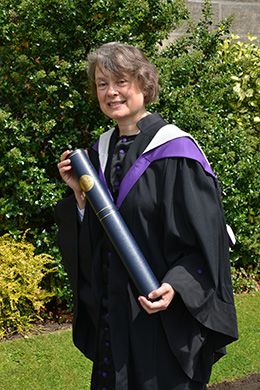Laureation address – Professor Sarah Coakley
Professor Sarah Coakley
Laureation Address
Laureator: Professor John Webster
Tuesday 24 June 2014
 Vice-Chancellor, it is my privilege to present Professor Sarah Coakley for the Degree of Doctor of Divinity, honoris causa.
Vice-Chancellor, it is my privilege to present Professor Sarah Coakley for the Degree of Doctor of Divinity, honoris causa.
By common consent, Professor Coakley is one of the most eminent and original of contemporary divines. After a distinguished undergraduate and postgraduate career at Cambridge, she taught for a number of years at the University of Lancaster and then briefly in Oxford, before moving to Harvard as Professor of Divinity and then Mallinckrodt Professor, an appointment which gave recognition to her talents and early reputation, and afforded opportunity for the exercise of her powers of mind and intellectual leadership in one of the great divinity schools of the English-speaking world. She returned to the other Cambridge in 2007 as Norris-Hulse Professor and Professorial Fellow at Murray Edwards College.
Over the course of her career, Professor Coakley has generated a corpus of writings of singular range, authority and independence of mind. She has left few elements of Christian divinity untouched, and all those to which she has given her mind bear the impress of her peculiar combination of analytical toughness, innovation and human delicacy. As a student of the Christian past, especially of its early centuries, she is one of a cadre of contemporaries who have gone to the writings of classical thinkers (in Professor Coakley’s case, for example, Gregory of Nyssa or Pseudo-Dionysius) with the expectation that they will help us think our way beyond conventional restrictions and provide sources of innovation and enrichment. She has written widely on the theological import of gender, sexuality, desire, embodiment and the emotions. Her contributions to feminist theology are especially noteworthy: she has sought not only to honour the sense of desolation and unrighteousness which drove an earlier generation of feminist writing, but also to recognise its attendant restrictions, and the need to complete its trajectory by freeing it from entanglement with resentment and the pathology of victimhood.
She has, in addition, undertaken notable work in conducting the conversation between theology and the natural and social sciences along different paths of inquiry, treating, for example, the place of co-operation in evolutionary theory. Most recently, she has begun the task of drawing together the threads of these various lines of inquiry into a multi-volume systematic theology, the first part of which has recently appeared. It is here that she displays to fullest effect the virtues to be found in earlier explorations: a privileging of ascetical and contemplative attention to the divine; openness to the necessity in theological work of extended and sometimes painful intellectual transformation; a refusal of principled antithesis between, as well as premature synthesis of, philosophy, natural and social science and divinity; a sense that orthodoxy is a goal, not an already-achieved place of complacent rest.
It is consistent with this conception of theology that Professor Coakley’s work is often collaborative and its rhetoric commonly exploratory rather than conclusive. It is, moreover, entirely of a piece with her apprehension of the theological task that her work arises from contemplative practice and is a primary element of priestly vocation. There are few contemporary divines in whom intellectual labour is so deliberately and effectively integrated into the transformation of life by desire for God.
Professor Coakley’s large and varied contributions to theology, and her leadership within her field, have been recognised many times: by the translation of her work into other languages; by the award of honorary degrees; by election to present illustrious series of lectures – inter alia the Hulseans, the Hensons and the Aberdeen Giffords. Today it is the happy turn of this university to offer its recognition of one of the most varied, original and provocative contributions to the work of Christian theology in the last quarter century. Vice-Chancellor, in recognition of her substantial contribution to Christian theology, I invite you to confer on Professor Sarah Coakley the degree of Doctor of Divinity, honoris causa.
Category Awards